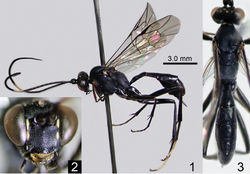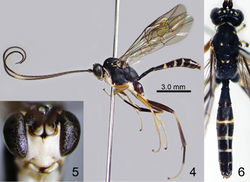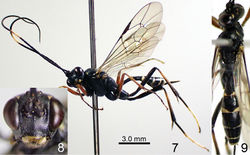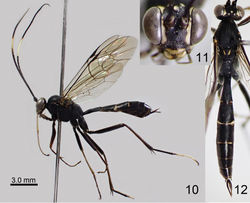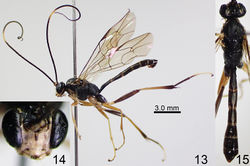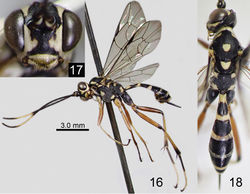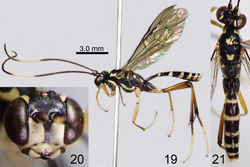Amphirhachis
| Notice: | This page is derived from the original publication listed below, whose author(s) should always be credited. Further contributors may edit and improve the content of this page and, consequently, need to be credited as well (see page history). Any assessment of factual correctness requires a careful review of the original article as well as of subsequent contributions.
If you are uncertain whether your planned contribution is correct or not, we suggest that you use the associated discussion page instead of editing the page directly. This page should be cited as follows (rationale):
Citation formats to copy and paste
BibTeX: @article{Watanabe2017ZooKeys, RIS/ Endnote: TY - JOUR Wikipedia/ Citizendium: <ref name="Watanabe2017ZooKeys">{{Citation See also the citation download page at the journal. |
Ordo: Hymenoptera
Familia: Ichneumonidae
Name
Amphirhachis Townes, 1970 – Wikispecies link – Pensoft Profile
- Amphirhachis Townes, 1970: 33. Type species: Amphirhachis nigra Townes, 1970. Original designation.
Description
Body covered with short setae. Head and mesosoma mat, covered with dense punctures. Ventral margin of clypeus blunt, without a median notch. Occipital carina complete. Lower end of occipital carina connected to hypostomal carina distant from base of mandible. Antenna with tyloid-like carina on ventral surface of basal 9–14 segments in female. Mesoscutum without a raised anterolateral area on each side. Epomia absent. Epicnemial carina present laterally and ventrally. Hind rim of metanotum without a sublateral triangular projection. Fore wing with: junction of vein Cu1 and vein Cu-a slightly distant or opposite to junction of Rs+M and M+Cu; Cu-a more or less inclivous; large areolet, receiving vein 2m-cu near or at its outer corner; 2m-cu with a single narrow bulla that is ca. 0.2 as wide as the portion of 2m-cu behind the bulla. Hind wing with distal abscissa of Cu1 meeting cu-a slightly closer to 1A than M. Tarsal claws pectinate. Posterior transverse carina of propodeum largely absent, only represented by a weak or faint vertical ridge at apex of each side and/or on median part. T1 with basal half more or less stout, its spiracle in front of middle. Median dorsal and dorsolateral carinae of T1 absent. Ovipositor sheath shorter than 0.6 times as long as hind tibia. Subgenital plate pentagonal, posterior margin weakly concave medially. Apex of paramere not projected beyond apex of aedeagus, apical margin round. Basal apodeme of aedeagus 0.3–0.4 times of total length of aedeagus.
Distribution
Eastern Palaearctic and Oriental regions.
Remarks
The above description is partly referred from diagnosis provided by Townes (1970)[1], Chandra and Gupta (1973) and Kuslitzky (1995). The world species of Amphirhachis can be identified by the key presented below. The antennal tyloid-like carina was recognized in all Japanese species and was not found in other genera of Japanese Atrophini. These points support the hypothesis proposed by Kuslitzky (1995), i.e., that carina is one of the generic characters of Amphirhachis. In all Japanese species, the number of segments with that carina are varied between basal 9 to 14 segments. This number is usually 12 and the apex of the carina is never surpassed at apex of white band.
Key to World species of the genus Amphirhachis
Taxon Treatment
- Watanabe, K; 2017: Revision of the genus Amphirhachis Townes, 1970 (Hymenoptera, Ichneumonidae, Banchinae) from Japan ZooKeys, (685): 49-64. doi
Images
|
Other References
- ↑ Townes H (1970) The genera of Ichneumonidae, part 3. Memoirs of the American Entomological Institute 13: 1–307.
